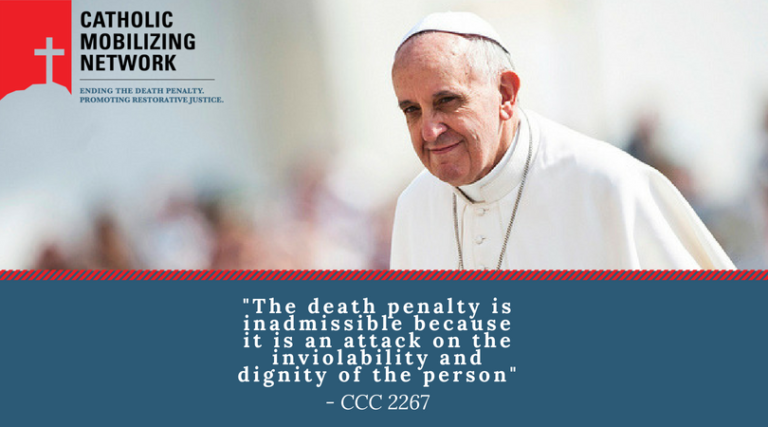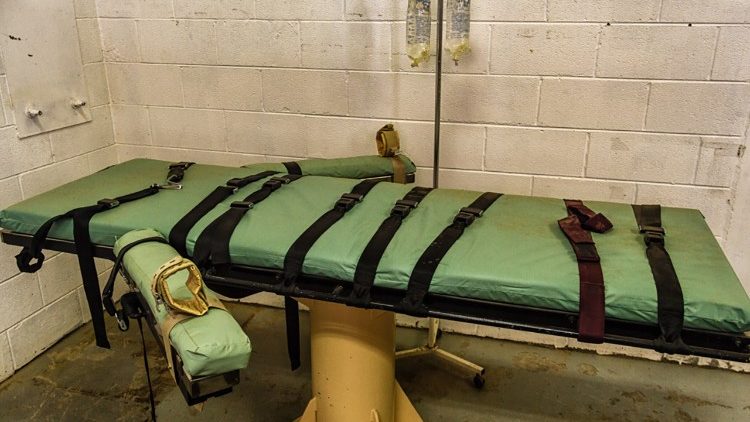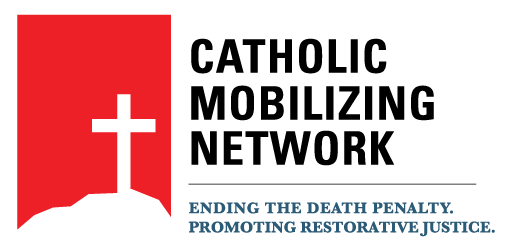 “The death penalty is inadmissible because it is an attempt against the inviolability and dignity of the person.” – Pope Francis, October 11, 2017, Speech to members of the Pontifical Council for the Promotion of the New Evangelization
“The death penalty is inadmissible because it is an attempt against the inviolability and dignity of the person.” – Pope Francis, October 11, 2017, Speech to members of the Pontifical Council for the Promotion of the New Evangelization
“The new evangelization calls for followers of Christ who are unconditionally pro-life: who will proclaim, celebrate and serve the Gospel of life in every situation. A sign of hope is the increasing recognition that the dignity of human life must never be taken away, even in the case of someone who has done great evil. Modern society has the means of protecting itself, without definitively denying criminals the chance to reform. I renew the appeal I made most recently at Christmas for a consensus to end the death penalty, which is both cruel and unnecessary.” – Pope John Paul II, Mass in St. Louis, MO, January 27, 1999
I have set before you life and death, the blessing and the curse. Choose life, then, that you and your descendants may live. (Dt 30:19)
NEW REVISION APPROVED FOR CATECHISM SECTION ON DEATH PENALTY

Pope Francis has approved Congregation for the Doctrine of the Faith (CDF) changes to the Catechism on the death penalty. See this story from Vatican News for a comparison of the new and previous texts, continuity with preceding Magisterium, including the authentic development of doctrine affirmed by Pope St. John Paul II and Pope Benedict XVI, and further explanation.
The new text
The death penalty
2667. Recourse to the death penalty on the part of legitimate authority, following a fair trial, was long considered an appropriate response to the gravity of certain crimes and an acceptable, albeit extreme, means of safeguarding the common good.
Today, however, there is an increasing awareness that the dignity of the person is not lost even after the commission of very serious crimes. In addition, a new understanding has emerged of the significance of penal sanctions imposed by the state. Lastly, more effective systems of detention have been developed, which ensure the due protection of citizens but, at the same time, do not definitively deprive the guilty of the possibility of redemption.
Consequently, the Church teaches, in the light of the Gospel, that “the death penalty is inadmissible because it is an attack on the inviolability and dignity of the person”,[1] and she works with determination for its abolition worldwide”.
[1] FRANCIS, Address to Participants in the Meeting organized by the Pontifical Council for the Promotion of the New Evangelization, 11 October 2017: L’Osservatore Romano, 13 October 2017.
*****
Read further at OC Catholic: Death Penalty
Explanation of revision from Vatican’s CDF: http://press.vatican.va/content/salastampa/it/bollettino/pubblico/2018/08/02/0556/01210.html#letteraing
OVERVIEW
Catholic teaching offers a unique perspective on crime and punishment. It begins with the recognition that the dignity of the human person applies to both victims and offenders. It affirms our commitment to seek justice, comfort and support victims and their families, while acknowledging the God-given dignity of every human life, even for those who do great harm. Catholic teaching on human life is rooted in the belief that all life has inherent dignity and is a gift from God that must be respected and defended from conception until natural death.
In his encyclical The Gospel of Life, Pope John Paul II challenged followers of Christ to be “unconditionally pro life.” He reminded us that “the dignity of human life must never be taken away, even in the case of someone who has done great evil. Modern society has the means of protecting itself, without definitively denying criminals the chance to reform” (Gospel of Life, 27).
In 2005, the Catholic bishops of the United States issued, A Culture of Life and the Penalty of Death. In the document the bishops stated that the gift of life must be respected and protected; “that every life is a precious gift from God (see Gn 2:7, 21-23) and that we are all created in God’s image and redeemed by Jesus Christ, who himself was crucified. They acknowledged that sentences such as “life in prison without parole” provide non-lethal alternatives and called for an end to the use of the death penalty in the United States, stating “it is time for our nation to abandon the illusion that we can protect life by taking life.”
TAKING ACTIONS
- Prayer
- End Death Penalty Prayer Cards: English, Español
- Prayer for an End to the Death Penalty (here)
- Intercessory Prayers
- Liturgical Resources from Catholic Mobilizing Network
- Say the Pax Christi Prayer to abolish the death penalty. Pray for prisoners on death row. October 10 is the International Day to abolish the death Penalty.
- Hold a Group Discussion on Ending the Death Penaltyor bring the topic of the death penalty to your ministry
- Contact a legislator and share your opinions on the Death Penalty
- Write to and get to know a prisoner on death row as a parish activity
- Read Dead Man Walking by Sr. Helen Prejean
- Join the Efforts of The Catholic Mobilizing Network to end the use of the Death Penalty
- Sign the Catholic Mobilizing Network Pledge here
- Keep up to date with the current executions so that you can pray for the victims. Visit the Death Penalty Information Center.
- Sign up for the Death Penalty Discourse Newsletter with Helen Prejean
- Join the Death Penalty Focus Chapter of Orange County which meets on the third Wednesday of each month from
7:00 p.m. -8:30 p.m. at St. Joseph Center, 480 S. Batavia St. Orange. Contact Jan Urban at [email protected] or [email protected]
RESOURCES
- The Gospel of Life and Capital Punishment
- Catholic Campaign to End the Use of the Death Penalty
- Resources on Ending the Use of the Death Penalty in California
- 2016 Elections: Death Penalty Resources
CONNECT WITH GREAT ORGANIZATIONS
CONTACT
Jan Urban
Chair, Orange County Chapter
Death Penalty Focus
714-423-5802
[email protected]
“the traditional teaching of the Church does not exclude recourse to the death penalty, if this is the only possible way of effectively defending human lives against the unjust aggressor. If, however, non-lethal means are sufficient to defend and protect people’s safety from the aggressor, authority will limit itself to such means… the cases in which the execution of the offender is an absolute necessity ‘are very rare, if not practically nonexistent” (CCC, 2267).
Church Teachings
- Abortion
- Adoption & Foster Care
- Care for Creation/Environmental Justice
- Catholic Campaign for Human Development
- Death Penalty
- Disabilities
- Domestic Violence
- Embryonic Stem Cell Research/Human Cloning
- End of Life Issues/Euthanasia
- Ethical Trade
- Faithful Citizenship
- Global Solidarity
- Homeless Persons’ Advocacy
- Human Trafficking
- Hunger/Food
- Immigration Services
- Labor/Employment
- Migration Ministry
- Organizing Tools
- Pregnancy Resources
- Racism
- Respect Life
- Restorative Justice/Mass Incarceration
- Social Teaching
- Torture/war



